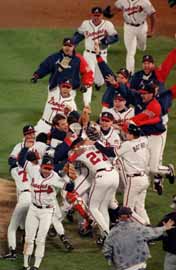A bibliometric manifesto
 Ilya Somin's post, Evaluating Billy Beane and Moneyball, at The Volokh Conspiracy has forced the issue. It is time for MoneyLaw to take a methodological stand. Although I've developed this theme far more extensively in my recent paper posted to SSRN, Modeling Law Review Impact Factors as an Exponential Distribution (which I plan to mine for many posts here at MoneyLaw), a briefer statement of the project is in order. In the spirit of David Grabiner's classic, A Sabermetric Manifesto, I'll call this declaration A Bibliometric Manifesto.
Ilya Somin's post, Evaluating Billy Beane and Moneyball, at The Volokh Conspiracy has forced the issue. It is time for MoneyLaw to take a methodological stand. Although I've developed this theme far more extensively in my recent paper posted to SSRN, Modeling Law Review Impact Factors as an Exponential Distribution (which I plan to mine for many posts here at MoneyLaw), a briefer statement of the project is in order. In the spirit of David Grabiner's classic, A Sabermetric Manifesto, I'll call this declaration A Bibliometric Manifesto.It is no surprise that this forum takes its literary inspiration from Michael Lewis's book, Moneyball: The Art of Winning an Unfair Game. It is even less surprising that quantitatively inclined law professors should be drawn toward baseball and sabermetrics as the basis for evaluating their own profession. Baseball combines mathematical rigor with a respect for tradition. Just as sabermetrics represents what Bill James has called “the search for objective knowledge about baseball,” bibliometrics represents the quest to quantify texts, information, and the academic pursuit of truth. As with baseball and sabermetrics, the preeminence of mathematics transforms bibliometrics into a hopeful, uplifting enterprise.
Bibliometrics does differ from its sabermetric counterpart in one crucial respect. Whereas law aspires to define itself as the grand “enterprise of subjecting human conduct to the governance of rules,” baseball affects nothing besides the happiness of devoted individuals who play or follow “a game with increasingly heightened anticipation of increasingly limited action.” As observed in the recent blockbuster, The Wages of Wins, sports “do not often change our world; rather they serve as a distraction from our world.” Statistical evaluation of baseball is fun precisely because it is frivolous.
Law, of course, is an altogether different game. Law takes itself quite seriously and legal education even more so. I say this even as a true adherent of the Church of Baseball. What bibliometrics ultimately learns from its sabermetric equivalent is therefore twofold. Let's take the math and the joy. We can, should, and must dedicate ourselves to quantitative rigor — without forgetting to have fun.
Play ball!













0 Comments:
Post a Comment
<< Home